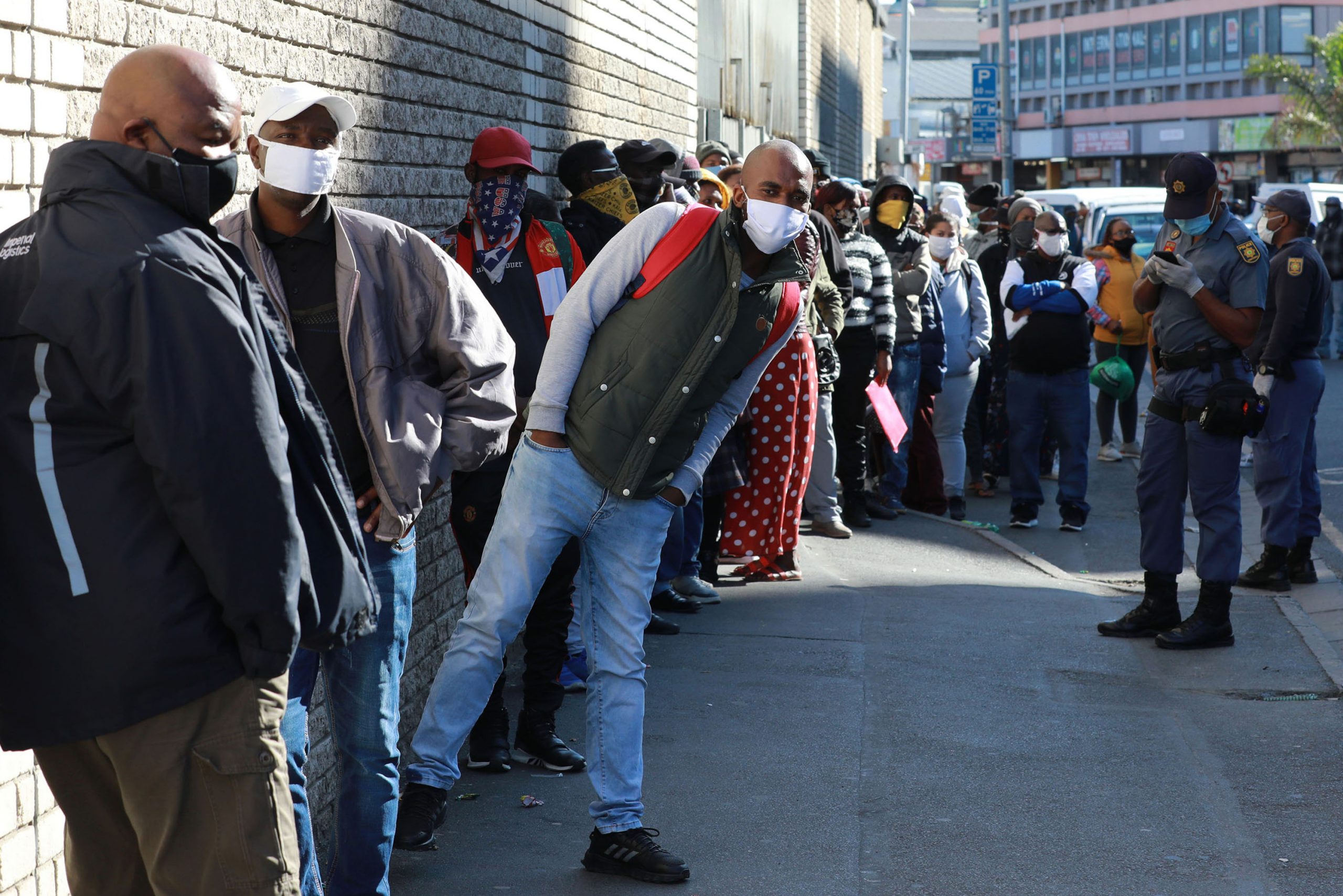Workers still can’t access Covid-19 relief
Despite promised amendments, workers are still unable to apply directly for financial relief from the government’s temporary relief scheme. Employers must do it on their behalf, but many refuse.
Author:
7 July 2020

“On paper, workers can apply directly. But on the system, they are not allowed,” says Izwi Domestic Workers Alliance activist Florence Sekolane, referring to the government’s financial relief scheme for workers during the Covid-19 pandemic and lockdown.
In late March, the government launched a programme to help employers pay workers, called the temporary employer and employee relief scheme (TERS). Initially, employers contributing to the Unemployment Insurance Fund (UIF) were told to apply on behalf of their employees. Workers were not allowed to apply directly.
But after the Casual Workers Advice Office (CWAO), Izwi and the Women on Farms Project threatened to take legal action – workers whose employers were deemed UIF non-contributors were initially excluded from applying for financial relief – this was amended to allow workers direct access to the fund.
Despite this, some workers still cannot apply for financial relief directly, particularly farm and domestic workers.
Farm workers treated unfairly
“Many farm workers continued to work right through the lockdown, but there were some who did not earn the normal salary. They were paid in food parcels with a much lesser value than [the] salary they normally earn,” says Chriszanne Janse van Vuuren of the Support Centre for Land Change (SCLC), an Eastern Cape organisation.
The farm workers who complained about being paid in food parcels were dismissed unfairly and the SCLC is dealing with these matters, says Janse van Vuuren.
“Even though [farm workers] were considered an essential service and allowed to work, one would have expected that their working conditions, which are poor as it is – I mean they have got terrible working conditions even without Covid-19 – but one would have expected that Covid-19 wouldn’t impact their working conditions negatively, but unfortunately it has,” says Janse van Vuuren. “Even before the hard lockdown and level five, we started receiving complaints from farm workers that they were not allowed to go to town to buy basic necessities. So, farmworkers are … imprisoned on the farm, but the farmer is allowed to go to town. Covid-19 is the excuse.”
Had farmers ensured workers had everything they needed, including medication, food and basic necessities, it would have been better, but this has not been the case. Even now, at advanced level three of the lockdown, some farm workers are still not allowed to go to town. “Some farmers tell them directly, ‘If you want to go to town, go. But do not come back.’ Scared [of] losing your job, you remain,” says Janse van Vuuren.

Excluded from the fund
Sekolane, who organises domestic workers and works as one, says migrant domestic workers have been most affected by the Covid-19 lockdown. “Most of them were not being paid and were at home with their families without an income. Some of them are migrant workers and didn’t benefit [from] food parcels and [the] R350 relief from the government.”
“The majority of non-registered workers [for UIF] continue to be excluded from the TERS relief [fund],” said Lynford Dor of the CWAO, “despite the amendments made to the C19 TERS Directive on 25 May, which extended the scheme’s scope to cover these workers.” The fund still requires “non-registered workers to first be registered before they can receive the TERS money.
“We would like the [Department of Employment and Labour] and UIF to clarify why this is the case, because it means that non-compliant employers first have to ‘declare’ these workers before the money can go through,” said Dor.
Related article:
Registration of domestic workers for UIF by their employers remains a big challenge, says Sekolane. Without being registered, these workers cannot claim from the relief fund. The department seems to “have somehow forgotten that the scope of the scheme was extended to cover non-registered workers precisely because their employers refuse to register them”, adds Dor.
The UIF said on 19 June that it had “made a difference to the lives” of more than three million workers and spent R23 billion between 16 April and 17 June. But UIF commissioner Teboho Maruping conceded that it had not been able to reach the most vulnerable workers, including domestic workers. There are more than a million such workers in South Africa and the UIF said that only 35 374 had accessed the fund.
Questions sent to the labour department on the scope of TERS and other related issues went unanswered.
Conference call to the UIF
For One Wage Campaign coordinator Ronaldo Wesso, the majority of workers are yet to access the fund, either through employers or directly. The One Wage Campaign is a network of worker organisations and activists fighting for all workers to get the same minimum wage. They organised a conference call to the UIF helpline.
Wesso told New Frame before the conference call on 25 June that the aim was to get information about the procedure workers must follow to apply directly to the UIF and to expose the discrepancy between what is on paper and workers’ experiences.
Sekolane, who participated in the conference call, said workers were hoping to learn how they could access the fund without employers applying on their behalf, but were left “uninspired” by the advice they received from the helpline.
Related article:
“Workers still cannot make direct applications, the system does not give them access,” said Sekolane.
Dor agreed. “The UIF website still only provides for employer applications, and whenever workers go to the … labour centres to try and apply, they are simply sent back to beg their employer to do so on their behalf.”
Maruping said the UIF “has been, and continues to encourage employers to lodge claims on behalf of their workers, particularly workers in vulnerable sectors like domestic workers and farming, to apply for May relief payments. And again, based on the figures, it seems not enough people have taken the opportunity to apply.”
Disturbing trend
“The other challenge is that when employers apply, they sit on the money and don’t give it to workers,” says Sekolane.
Janse van Vuuren has also noticed this trend. “We have a case of a particular farm that has a significant number of farm workers, where the cash funding has been paid out to the farmer but has not been paid out yet to workers.”
Both activists insisted that money be paid directly to workers.
The UIF has said 154 310 workers have been paid from the Covid-19 relief fund. It is not clear if these workers applied directly or through their employers. But the department agreed that paying workers directly “means that the workers get relief payment much quicker”.
The high number of retrenchments across various sectors means the department will be dealing with a huge number of UIF applications, aside from those made to TERS. This will affect the liquidity of the fund. The commissioner said it will find ways to keep the fund afloat, but workers are concerned.
“The UIF process is generally a nightmare,” said Janse van Vuuren. “People can wait up to four years in this area [the Eastern Cape] for UIF payments. Papers get lost, cases are not reported properly or farm workers would be told to come back next week, next week, and then time just goes by.”


